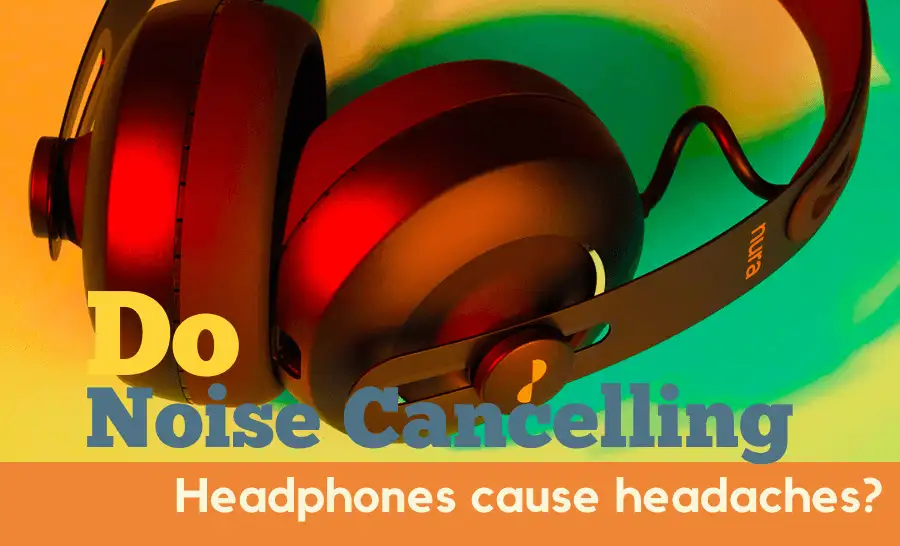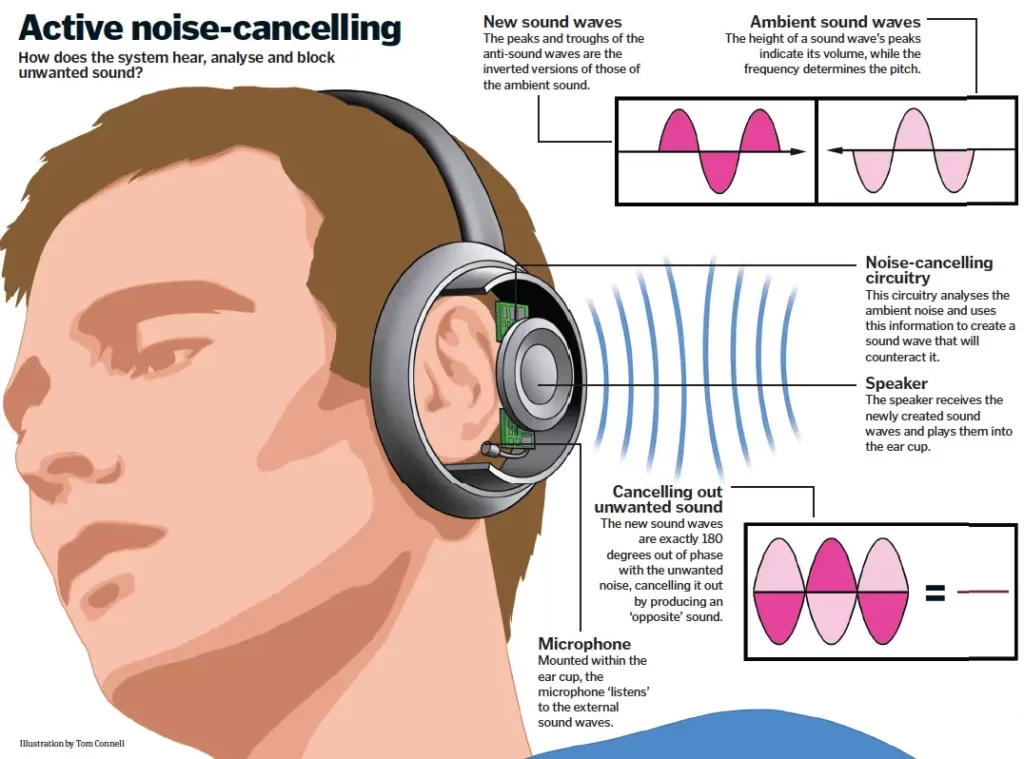Do Noise Cancelling Headphones cause headaches?
Do Noise Cancelling Headphones cause headaches?
 Noise-canceling headphones are ideal for focusing completely on your audio or podcast without the need for exterior sounds to ruin the ambience. If you're considering getting a pair of noise cancelling, you might be unsure about whether they'll cause headaches.
First of all, it’s important to understand why people might experience headaches when using noise cancelling headphones. One potential reason is that the headphones can actually increase the overall level of noise in your environment. This can be especially problematic for people who are already sensitive to sound, as it can lead to a more severe headache.
Another possibility is that the active noise cancellation process can be jarring for some people’s ears.
Here, I'll explain why wearing noise-canceling headsets may cause headaches and if it's bad for you to wear them the whole time. If you're going to wear noise-cancelling headphones, I'll also explain whether they can hurt your ears and whether there's anything you can to prevent headaches while wearing the headphones.
Noise-canceling headphones are ideal for focusing completely on your audio or podcast without the need for exterior sounds to ruin the ambience. If you're considering getting a pair of noise cancelling, you might be unsure about whether they'll cause headaches.
First of all, it’s important to understand why people might experience headaches when using noise cancelling headphones. One potential reason is that the headphones can actually increase the overall level of noise in your environment. This can be especially problematic for people who are already sensitive to sound, as it can lead to a more severe headache.
Another possibility is that the active noise cancellation process can be jarring for some people’s ears.
Here, I'll explain why wearing noise-canceling headsets may cause headaches and if it's bad for you to wear them the whole time. If you're going to wear noise-cancelling headphones, I'll also explain whether they can hurt your ears and whether there's anything you can to prevent headaches while wearing the headphones.
2. What is active noise-cancellation?
Active noise-cancellation is a process that uses inverse waves to eliminate any unwanted sound. The technology has been used in headphones for a few years now, but there are also active noise-cancelling earbuds on the market. These earbuds have tiny microphones that pick up ambient noise and then create inverse waves to cancel it out. This process is what helps to drown out the sound of traffic, airplane engines, and other unwanted noises.
 Noise-canceling headphones are ideal for focusing completely on your audio or podcast without the need for exterior sounds to ruin the ambience. If you're considering getting a pair of noise cancelling, you might be unsure about whether they'll cause headaches.
First of all, it’s important to understand why people might experience headaches when using noise cancelling headphones. One potential reason is that the headphones can actually increase the overall level of noise in your environment. This can be especially problematic for people who are already sensitive to sound, as it can lead to a more severe headache.
Another possibility is that the active noise cancellation process can be jarring for some people’s ears.
Here, I'll explain why wearing noise-canceling headsets may cause headaches and if it's bad for you to wear them the whole time. If you're going to wear noise-cancelling headphones, I'll also explain whether they can hurt your ears and whether there's anything you can to prevent headaches while wearing the headphones.
Noise-canceling headphones are ideal for focusing completely on your audio or podcast without the need for exterior sounds to ruin the ambience. If you're considering getting a pair of noise cancelling, you might be unsure about whether they'll cause headaches.
First of all, it’s important to understand why people might experience headaches when using noise cancelling headphones. One potential reason is that the headphones can actually increase the overall level of noise in your environment. This can be especially problematic for people who are already sensitive to sound, as it can lead to a more severe headache.
Another possibility is that the active noise cancellation process can be jarring for some people’s ears.
Here, I'll explain why wearing noise-canceling headsets may cause headaches and if it's bad for you to wear them the whole time. If you're going to wear noise-cancelling headphones, I'll also explain whether they can hurt your ears and whether there's anything you can to prevent headaches while wearing the headphones.
Why Does My Head Hurt With Noise Cancelling?
Noise cancelling headphones are a popular way to reduce environmental noise and distractions. But for some people, wearing these headphones can actually contribute to a headache. Recent research suggests that this is because noise cancelling headphones work by using active noise reduction (ANR) technology to create an antisound wave that cancels out the sound you're trying to avoid. This can be effective in reducing noise levels, but it can also put stress on your ears and lead to discomfort or pain. Read more: Best Noise Cancelling Headphones and Earbuds for 2022How Headphones' Noise-Canceling Mechanism works?
Headphones have become a staple in everyday life, used for everything from listening to music on the go to cancelling out the noise of a busy office. But how do headphones work? We will explore the basics of a headphones' noise-cancelling mechanism and why it's important. Noise-canceling headphones can work in two ways to remove the background noise. The first way is by using an electronic filter to block out the sound. The second way is by using a microphone to pick up the sound and then play it back out of the headphones at a lower volume. This method is called "phase cancellation. First, it's important to understand what noise-cancellation is. Noise-cancellation is the process of reducing or eliminating unwanted sound waves. In the context of headphones, this means that the headphones create their own sound waves that are opposite in phase to the ambient sound waves, thereby cancelling them out. There are two main types of noise-cancellation: passive and active. Passive noise-cancellation is achieved by using materials that absorb sound, such as earplugs or foam pads on headphones.1. What is passive noise-cancellations?
Passive noise-cancellation is a technology used in headphones and other audio devices to reduce or completely eliminate environmental noise. It works by using microphones to pick up outside sound, then processing and playing back an inverted sound wave that cancels out the original noise. This is done without any input from the user, making it a passive process. Passive noise-cancellation is often found in high-end headphones, as well as products aimed at reducing environmental noise in places like offices and airplanes.2. What is active noise-cancellation?
Active noise-cancellation is a process that uses inverse waves to eliminate any unwanted sound. The technology has been used in headphones for a few years now, but there are also active noise-cancelling earbuds on the market. These earbuds have tiny microphones that pick up ambient noise and then create inverse waves to cancel it out. This process is what helps to drown out the sound of traffic, airplane engines, and other unwanted noises.
The Headphones' High Volume cause headaches?
Some people who listen to music on their headphones at high volumes can experience headaches. The cause of the headaches is not yet known, but some experts believe that it has to do with the way the headphones create pressure on the head. Other experts believe that it has to do with the way sound waves are transmitted through the air and then into the ear drum. Until more is known, people who experience headaches when listening to music on headphones should avoid doing so at high volumes. Noise-canceling headphones are a great way to enjoy listening to your favorite music at a high volume. Unfortunately, listening to loud music or content can hurt your head. Listening to loud sounds through headphones can make the superficial blood vessels in your head widen, and these dilated blood vessels can put pressure on the skull's trigeminal sensory nerve fibers, which respond by releasing proteins to cause a headache. If you get migraines often, it might be best to lower the volume, as listening to high-volume content with your noise-canceling headphones can trigger a migraine. Lowering the volume is an easy way to prevent headaches from listening to loud content through your noise-canceling headphones. It might be worth trying, as listening to long-term use loud music can cause hearing loss.The tight Headphone Band cause headaches?
If you're like most people, you probably enjoy listening to music or watching TV shows and movies on your laptop or phone. But have you ever gotten a compression headache from wearing headphones too tight? You're not alone. Studies show that the tight headphone band can cause headaches in some people. In fact, it's one of the most common causes of headaches among people who wear headphones. The main reason why the tight headphone band causes headaches is because it puts pressure wave on your temples. This pressure can cause pain and tension in your head and neck, which can lead to a headache. If you tend to get headaches from wearing headphones, try using a looser band or adjusting the size of the ear cups so they fit more comfortably on your ears. You may also want to take breaks from listening to music or watching TV shows and movies every 30 minutes or so.Wearing noise cancelling headphones all day
Noise-cancelling headphones are a recent invention that have become very popular. They are headphones that have a special ability to cancel out noise, which is why they are often used on airplanes. Noise-cancelling headphones are a popular way to reduce the amount of noise in your environment. However, there is some speculation that wearing them for long periods of time can have negative effects on your health complications. Some experts say that wearing noise-cancelling headphones for too long can lead to temporary hearing loss, ringing in the ears, and even headaches. But, if you're not careful, they can also give you headaches or earaches. Here are a few tips to make sure your headphones don't give you any trouble:- Make sure your headphones fit properly. If they're too tight, they can put pressure on your ears and give you a headache.
- Don't listen to music too loudly. You might not realize it, but noise-cancelling headphones can actually amplify the sound of music, which can cause hearing damage over time.
- Take breaks every hour or so. Your ears need time to rest and if you don't take breaks, you might start to experience pain or discomfort.
Comments
Post a Comment